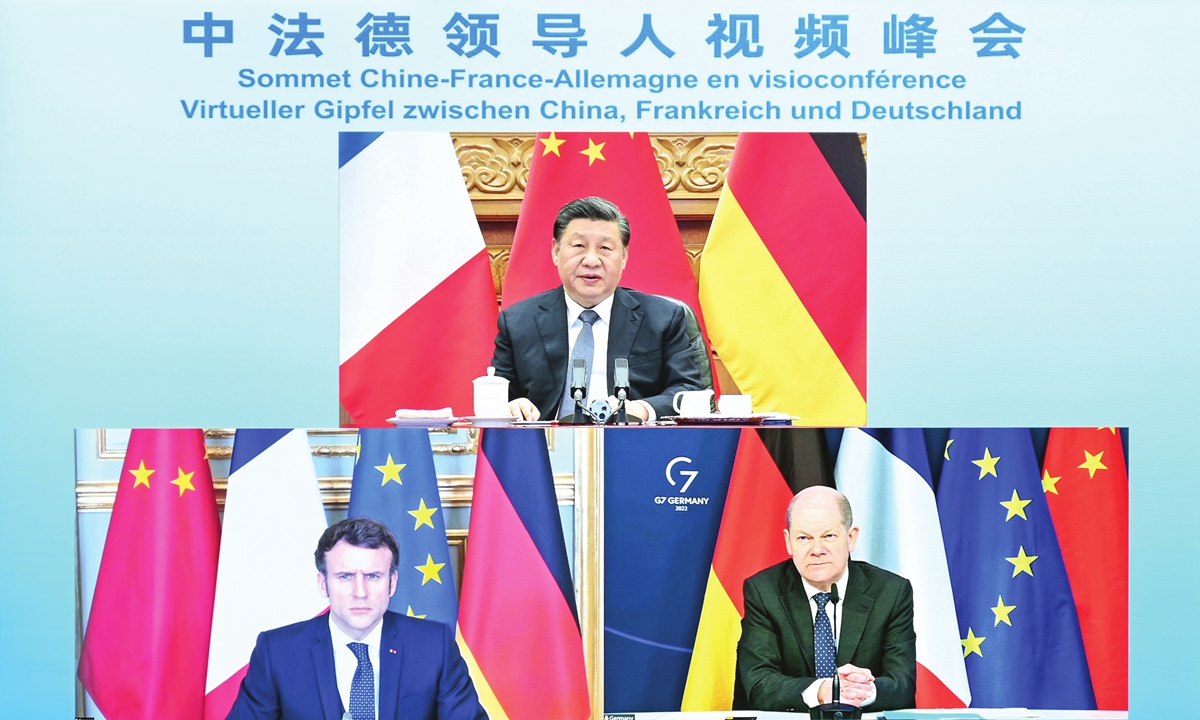
Chinese President Xi Jinping has a virtual summit with French President Emmanuel Macron and German Chancellor Olaf Scholz on Tuesday in Beijing. Photo: Xinhua
Chinese President Xi Jinping had a virtual summit with French President Emmanuel Macron and German Chancellor Olaf Scholz on Tuesday in Beijing, supporting France and Germany in promoting a balanced, effective and sustainable European security framework for the interests and lasting security of Europe.
Xi emphasized the need to jointly support the peace talks between Russia and Ukraine, while encouraging the two sides to maintain the momentum of negotiations and calling for maximum restraint to prevent a massive humanitarian crisis.
Experts said that the latest talks between Chinese and European leaders showed that China and Europe share similar stances and interests on the Ukraine situation, signaling that the two sides can effectively coordinate and cooperate on solving the Ukraine crisis and injecting new hope for an endgame of this crisis. As China also shares strategic mutual trust with Russia, it is expected to play a constructive role in helping tackle the current crisis, experts said.
The virtual meeting was held on the heels of the third round of negotiations between Ukraine and Russia, which reportedly ended with no major moves toward ending the 12-day military operation. The latest talks among the leaders of China, France and Germany were about a week after Xi held a crucial phone call with Russian President Vladimir Putin.
Xi stressed that the current situation in Ukraine is worrisome, and China is deeply grieved by the outbreak of war again on the European continent.
China maintains that the sovereignty and territorial integrity of all countries must be respected, the purposes and principles of the UN Charter must be fully observed, the legitimate security concerns of all countries must be taken seriously, and all efforts that are conducive to the peaceful settlement of the crisis must be supported, Xi said, noting that the pressing task at the moment is to prevent the tense situation from escalating or even getting out of control.
"The Xi-Putin conversation has played an active role in pushing forward the Russia-Ukraine negotiations, and I believe that Xi's virtual meeting with the French and German leaders would encourage the European side to have direct dialogue with Russia," Cui Hongjian, director of the Department of European Studies at the China Institute of International Studies, told the Global Times on Tuesday.
The essence of the crisis would eventually affect the security of Europeans themselves, so the further escalation of the Ukraine crisis would hinder local governance in Europe, Cui noted. Given the recent sanctions imposed by France and Germany against Russia, relations have become tense, which only makes the situation more complex, he said.
Although major European countries like Germany and France support economic sanctions against Russia, the sanctions would eventually hurt the continent itself, given that some key sectors of Europe such as oil and gas are highly dependent on Russia's exports, according to media reports.
Relevant sanctions will affect global finance, energy, transportation and stability of supply chains, and dampen the global economy which is already ravaged by the pandemic. This is in the interest of no one, Xi said during the virtual meeting.
"It also shows that China shares similar stances and interests with Europe on the Ukraine situation, which means that China and Europe can effectively coordinate," Li Haidong, a professor from the Institute of International Relations at the China Foreign Affairs University in Beijing, told the Global Times on Tuesday.
Meanwhile, China and Russia maintain high strategic mutual trust, and solving the Ukraine crisis needs the active participation of China with its contribution and solutions injecting new hope into the current dilemma, Li noted.
Chinese State Councilor and Foreign Minister Wang Yi laid out six initiatives on humanitarian assistance to Ukraine at a press conference on Monday on the sidelines of the fifth session of the 13th National People's Congress in Beijing. He said the process should respect the principles of justice and neutrality; pay full attention to homeless people in Ukraine; protect civilians to avoid secondary humanitarian disasters; ensure humanitarian aid can move smoothly; ensure the safety of foreigners in Ukraine; and support the UN to coordinate on humanitarian aid to Ukraine.
China supports France and Germany in promoting a balanced, effective and sustainable European security framework for the interests and lasting security of Europe, and upholding its strategic autonomy, Xi said, noting that China will be pleased to see equal-footed dialogue among the EU, Russia, the US and NATO.
As two leading countries in Europe, France and Germany will welcome China's role as it's a constructive factor in helping solve the security crisis in Europe, Li said.
China has been playing the role of promoting dialogue and solving the crisis through peaceful means, and the latest talks among Chinese and European leaders are believed to lead to some concrete action, in line with the growing momentum in the international community in promoting dialogue, Cui noted.
"Given the energy price surge in recent days, it has also become an urgent issue for Europe to seek dialogue, adding to the leverage for diplomatic negotiations," he said.




